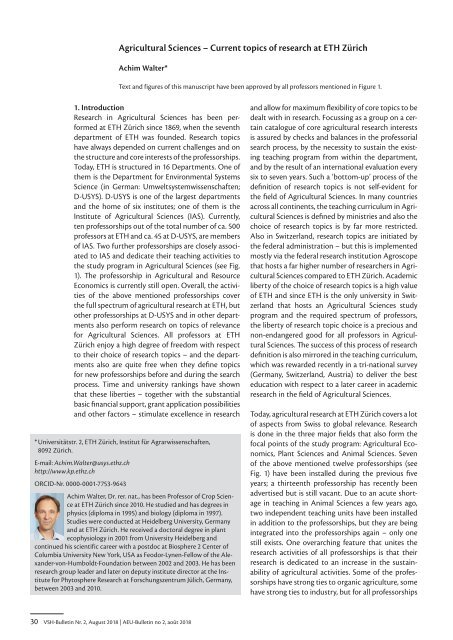12242_VSH_Bulletin_August_2018-3
Create successful ePaper yourself
Turn your PDF publications into a flip-book with our unique Google optimized e-Paper software.
Agricultural Sciences – Current topics of research at ETH Zürich<br />
Achim Walter*<br />
Text and figures of this manuscript have been approved by all professors mentioned in Figure 1.<br />
1. Introduction<br />
Research in Agricultural Sciences has been performed<br />
at ETH Zürich since 1869, when the seventh<br />
department of ETH was founded. Research topics<br />
have always depended on current challenges and on<br />
the structure and core interests of the professorships.<br />
Today, ETH is structured in 16 Departments. One of<br />
them is the Department for Environmental Systems<br />
Science (in German: Umweltsystemwissenschaften;<br />
D-USYS). D-USYS is one of the largest departments<br />
and the home of six institutes; one of them is the<br />
Institute of Agricultural Sciences (IAS). Currently,<br />
ten professorships out of the total number of ca. 500<br />
professors at ETH and ca. 45 at D-USYS, are members<br />
of IAS. Two further professorships are closely associated<br />
to IAS and dedicate their teaching activities to<br />
the study program in Agricultural Sciences (see Fig.<br />
1). The professorship in Agricultural and Resource<br />
Economics is currently still open. Overall, the activities<br />
of the above mentioned professorships cover<br />
the full spectrum of agricultural research at ETH, but<br />
other professorships at D-USYS and in other departments<br />
also perform research on topics of relevance<br />
for Agricultural Sciences. All professors at ETH<br />
Zürich enjoy a high degree of freedom with respect<br />
to their choice of research topics – and the departments<br />
also are quite free when they define topics<br />
for new professorships before and during the search<br />
process. Time and university rankings have shown<br />
that these liberties – together with the substantial<br />
basic financial support, grant application possibilities<br />
and other factors – stimulate excellence in research<br />
* Universitätstr. 2, ETH Zürich, Institut für Agrarwissenschaften,<br />
8092 Zürich.<br />
E-mail: Achim.Walter@usys.ethz.ch<br />
http://www.kp.ethz.ch<br />
ORCID-Nr. 0000-0001-7753-9643<br />
Achim Walter, Dr. rer. nat., has been Professor of Crop Science<br />
at ETH Zürich since 2010. He studied and has degrees in<br />
physics (diploma in 1995) and biology (diploma in 1997).<br />
Studies were conducted at Heidelberg University, Germany<br />
and at ETH Zürich. He received a doctoral degree in plant<br />
ecophysiology in 2001 from University Heidelberg and<br />
continued his scientific career with a postdoc at Biosphere 2 Center of<br />
Columbia University New York, USA as Feodor-Lynen-Fellow of the Alexander-von-Humboldt-Foundation<br />
between 2002 and 2003. He has been<br />
research group leader and later on deputy institute director at the Institute<br />
for Phytosphere Research at Forschungszentrum Jülich, Germany,<br />
between 2003 and 2010.<br />
and allow for maximum flexibility of core topics to be<br />
dealt with in research. Focussing as a group on a certain<br />
catalogue of core agricultural research interests<br />
is assured by checks and balances in the professorial<br />
search process, by the necessity to sustain the existing<br />
teaching program from within the department,<br />
and by the result of an international evaluation every<br />
six to seven years. Such a ‘bottom-up’ process of the<br />
definition of research topics is not self-evident for<br />
the field of Agricultural Sciences. In many countries<br />
across all continents, the teaching curriculum in Agricultural<br />
Sciences is defined by ministries and also the<br />
choice of research topics is by far more restricted.<br />
Also in Switzerland, research topics are initiated by<br />
the federal administration – but this is implemented<br />
mostly via the federal research institution Agroscope<br />
that hosts a far higher number of researchers in Agricultural<br />
Sciences compared to ETH Zürich. Academic<br />
liberty of the choice of research topics is a high value<br />
of ETH and since ETH is the only university in Switzerland<br />
that hosts an Agricultural Sciences study<br />
program and the required spectrum of professors,<br />
the liberty of research topic choice is a precious and<br />
non-endangered good for all professors in Agricultural<br />
Sciences. The success of this process of research<br />
definition is also mirrored in the teaching curriculum,<br />
which was rewarded recently in a tri-national survey<br />
(Germany, Switzerland, Austria) to deliver the best<br />
education with respect to a later career in academic<br />
research in the field of Agricultural Sciences.<br />
Today, agricultural research at ETH Zürich covers a lot<br />
of aspects from Swiss to global relevance. Research<br />
is done in the three major fields that also form the<br />
focal points of the study program: Agricultural Economics,<br />
Plant Sciences and Animal Sciences. Seven<br />
of the above mentioned twelve professorships (see<br />
Fig. 1) have been installed during the previous five<br />
years; a thirteenth professorship has recently been<br />
advertised but is still vacant. Due to an acute shortage<br />
in teaching in Animal Sciences a few years ago,<br />
two independent teaching units have been installed<br />
in addition to the professorships, but they are being<br />
integrated into the professorships again – only one<br />
still exists. One overarching feature that unites the<br />
research activities of all professorships is that their<br />
research is dedicated to an increase in the sustainability<br />
of agricultural activities. Some of the professorships<br />
have strong ties to organic agriculture, some<br />
have strong ties to industry, but for all professorships<br />
30 <strong>VSH</strong>-<strong>Bulletin</strong> Nr. 2, <strong>August</strong> <strong>2018</strong> | AEU-<strong>Bulletin</strong> no 2, août <strong>2018</strong>


